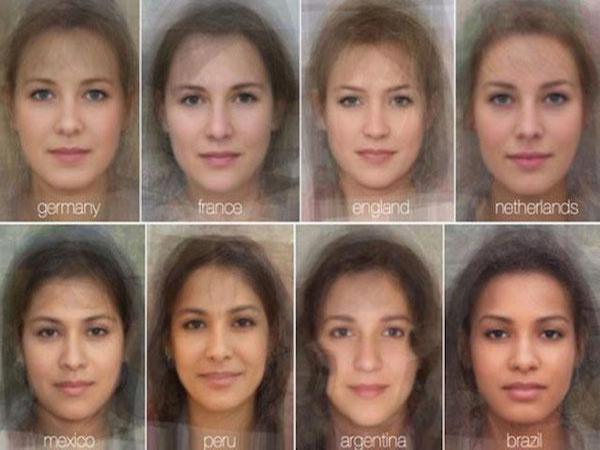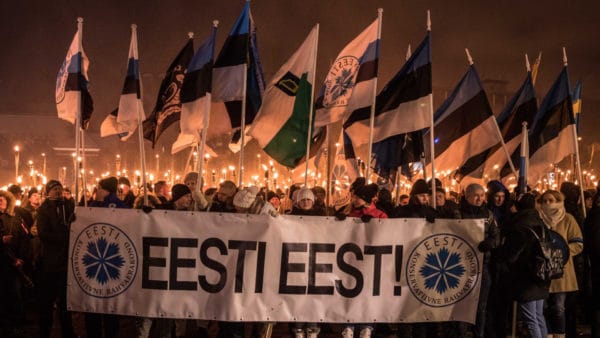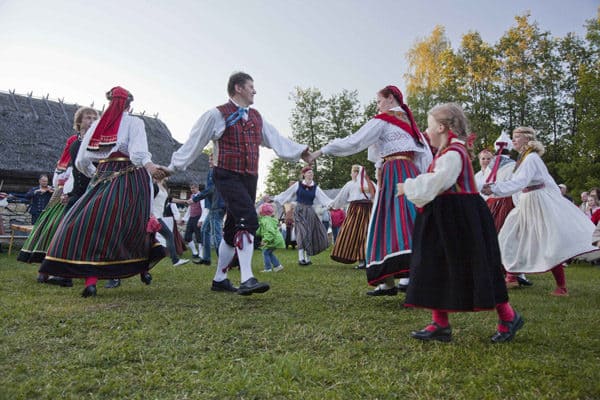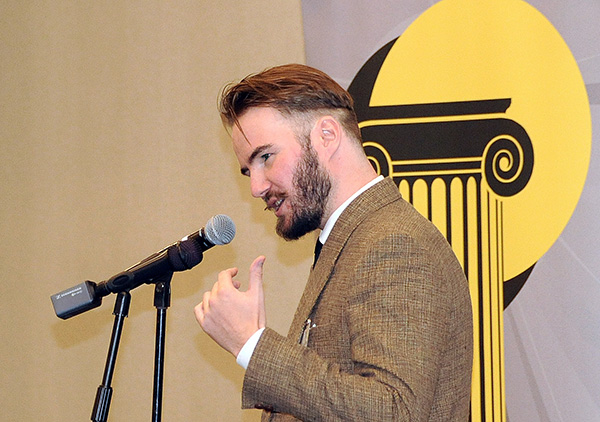Every Nation Is Perfect by Its Own Standards
Ruuben Kaalep, American Renaissance, August 31, 2023

Credit: american_rugbier, CC BY-SA 2.0, via Wikimedia Commons
Subscribe to future audio versions of AmRen articles here.
Adapted from remarks given at the 20th American Renaissance conference, August 12, 2023.
It fills my heart with delight to share with you the profound essence of Estonian nationalism and the priceless value of embracing our ethnic roots and ancestral spirits. Moreover, I firmly believe that my message speaks to all nationalists around the world.
For many years I have spoken, both in my home country and abroad, about a new, 21st-century, ethnofuturist nationalism. That is my calling. This 21st-century nationalism is not new in essence — it is rather an affirmation of the conclusions that all nationalist leaders and philosophers in every country have come to during all of human history. For me, it is an ethnonationalist worldview, because in my part of the world, nation and ethnos are synonymous. There is no nationalism but ethnic nationalism. Yet this worldview that I preach is novel in its approach. It transcends postmodernism and does not waste time standing for lost positions. Rather than defend and conserve, it creates.
In the modern era, from the beginning of the 19th century up through the first half of the 20th, we witnessed a grand pursuit of certainty and absolute meaning, which was expressed in ideologies that claim a monopoly on absolute truth. All those ideologies, including the liberal and democratic ones, are to a degree totalitarian. They yearn to stand firmly on solid ground, while seeking to know the mysteries of existence. But in their fervor for clear-cut truths, they overlook the subtle whispers of ancient wisdom. They set the stage, but among the bright lights of their certainty, they leave shadows.
Enter postmodernism, the deconstruction of all meanings. The postmodernists dismantle the modernist structures, exposing the fragileness of certainty. They challenge the once-solid foundation of Enlightenment truth, beneath which is exposed relativity and multiplicity. In their struggle to deconstruct, they question the authority of fixed accounts. But they are trapped by their very opposition to meaning itself. They forget the essence of life, the intricate patterns and threads that have shaped the ethnic dimension of human existence. In this whirlwind of deconstruction, they lose sight of the beauty they once sought to reveal. They become entranced by the chaos, forgetting that within the interplay of opposites lies harmony.
Postmodernism can shatter an ethnic spirit into a million fragments, each reflecting a different shade of confusion for those who cannot see the whole. It revels in the destruction of traditional values, dismissing them as mere social constructs. But in its reckless pursuit of deconstruction, it fails to see that it is deconstructing the very foundations of its own existence. It prides itself on rejecting grand epics but ironically becomes one itself. Preaching tolerance and inclusivity, it is intolerant of any dissenting voices. It preaches freedom of thought but traps us in a cage of solipsism.
It is sad to hear one’s fellows express disdain for a heritage that you share. Such rejection of our European culture serves only to distance those who reject it from understanding the connectedness of all life and the universality of wisdom. To reject one’s own ethnic spirit is to reject a part of oneself. Doing so denies the value and complexity that arise from the organic growth and even the beautiful struggle of cultures, languages, and nations.
Yet amid this total deconstruction, we find the essence of rebirth. Fragmented meanings begin to merge, and the shadows cast by modernism’s bright light meld with the subtleties revealed by deconstruction. Out of this reformation, when the ethnic spirit returns, it can harmonize the disparate parts. The hidden whispers of life, once inaudible, can finally be heard once again.
Here lies the secret of ethnofuturism. Postmodernist deconstruction unwittingly allows the return of meanings that modernism has overlooked. In pulling apart the rigid structures, the deconstructionists create an opportunity for hidden truths to re-surface. Behind the resulting chaos lies the essence of ethnic nationalism: an invitation to embrace the dance between uncertainty and certainty, chaos and order. Let us not get lost in the pursuit of absolute truths, but rather revel in the ever-changing flow of life’s mysteries. Let us honor the hidden whispers of our ancestors, of our sacred soil, of the subtleties of our native languages, for they hold the key to the cosmic dance of existence.
Nationalism invites us to embrace that dance. Let us embrace the opening of the door to the renaissance of hidden meanings, like the sun rising from the darkest night. And within this dance, we shall find the essence of our collective spirit, calling us to continue our rich traditions.
How do we find and reclaim the inner value of our ethnic spirit? A nation’s potential lies not merely in its manpower or in the abundance of its natural resources, or in its being more prosperous or more powerful than its neighbors. Only the surface level of ethnic identity has to do with such comparisons. True nationalism, like true faith or true love, does not need to be validated. In fact, true nationalism is nothing less than true love. The strength and meaning and value and freedom of a true nationalist are in his heart.
Every nation is perfect by its own standards. A fascinating technique from old-school ethnography is the creation of a generalized portrait of an ethnic group. Take photos of thousands of individuals, as though each were posing for an official document. Then print all the negatives on a single piece of photo paper, with a very brief exposure. The result is a blurred image of an imagined authentic “Frenchman” or “Estonian” or “Uzbek” or “Polynesian.” The image invariably appears remarkably beautiful, a testament to the wondrous nature of our world, in which true and beautiful diversity requires separation, because mixing destroys both diversity and beauty.

Sadly, this beauty is not often found in a typical Western consumer society. When the mixing of cultures and races creates a meaningless society, it is hard to blame those who have grown up within that society, because they have never known anything better. And yet deep inside, they all know there is a terrible lack of something fundamental. This lack gives rise to a profound identity crisis, not only in the Western world but everywhere, because globalism infects all cultures. Some cultures, such as that of Communist China, follow an older strain of globalism, but they all are part of a soulless global consumer society.
Our aim is to find and strengthen the pockets of resistance to that world society, resistance that is backed up by a rebirth of ethnic nationalism. Some forces, such as Russia, claim actively to resist globalism, but Russia is simply continuing the old Soviet Union’s geopolitical struggle against the United States. It tramples on the awakening ethnic identities of its smaller neighbors, as the Americans did in Iraq.
A better center of resistance is in Central and Eastern Europe and the Baltic countries. Although the people of those countries are not yet aware of their role, they have managed to preserve the healthy instincts of their European culture. In so doing, they have contributed to the growing division between the two halves of the European Union. For an ordinary Eastern European conservative, encountering what are called “Western” values can be a culture shock. Similarly, an ordinary Western European liberal might find himself bewildered when faced with the “European” values of the East. In one part of Europe, nationalism is still embraced as a healthy force, essential for a country and its people to thrive. It is a source of pride, a way of life, and a sacred duty. Yet, in another part of Europe, nationalism is deemed evil, dangerous, and destructive. It is associated with war, violence, and even genocide.
How can these completely different value systems converge to create a unified political system? There is only one path: one value system must absolutely dominate the other. That is precisely what has occurred within the European Union. The globalist value system has subjugated the foundational values of European nation-states.
The only way for those nation-states to survive as unique European homelands is to stand uncompromisingly against the twin enemies of nationalism: globalism and imperialism. Like swirling winds disrupting the serenity of a lake, those two enemies challenge the beauty of our living ethnic souls and spirits. Globalism, in its pursuit of a connected world, brushes aside the delicate nuances of true cultural diversity. The call for a universal identity overshadows the uniqueness of each nation. As the world becomes a global supermarket, the voices of small communities become silent in the cacophony of the masses. Imperialism, on the other hand, advances by conquest, seeking dominion over lands and hearts alike. It reaches far and wide, imposing its will upon cultures and peoples. The call for domination destroys the uniqueness of each nation, leaving a trail of shattered identities in its wake.
As Estonian nationalists — like all nationalists everywhere — we stand steadfast for the preservation of our unique identity and cherish our heritage and traditions. We must guard against the homogenizing force of globalism and resist the allure of imperial conquest.

To assume this sacred duty, we must not confine ourselves exclusively to political realms but embrace our heritage on a deeply personal level. We should reconnect our way of life to nature and to the arts. We must cherish our environment, tending to our lands with care and harmonizing our lives with the eternal rhythms of existence. By connecting to our soil and our forefathers, we align ourselves with a universal order. We revere the forests, lakes, mountains, and seas, for in them, we behold the souls of our forefathers. In the arts, through music, dance, literature, and every form of creative expression, we can see national spirit at its most eloquent. Let us revere and celebrate the great artists and poets of our past, for they can become the torchbearers of our ethnic revival centuries later.

Estonian folk dance group. (Credit Image: © Imago via ZUMA Press)
I want to share with you my faith and reverence for the spirits of our ancestors. They are our guardians, watching over us and bringing us blessings. As their custodians, we pass down stories and knowledge from generation to generation, maintaining a timeless bond. Through that bond, we respect and remember them and thank them forever.
Embrace the teachings of old, and be open to new wisdom. Let the wisdom of our national consciousness open doors to the past. Listen attentively to the voices of your ancestors, because their wisdom can help you in your hardest times; it can illuminate your path and inspire you in the journey of rediscovering your roots.
We are not mere bystanders but active participants in the unfolding of our history. Seasons change, tides rise and fall, and all that lives shall one day embrace death and rebirth. In the river of life, we are but ripples cascading through time, reflecting the eternal dance of creation and dissolution. Fear not the passage into the great unknown, for it is but a part of nature’s majestic cycle. Embrace the transience, for it reveals the hidden beauty of the impermanent world. For a nationalist whose roots are deep within his land, there is no fear of death, only joy of life.

Ruuben Kaalep
By nurturing our national identity with wisdom and love and duty, we nationalists will stand strong against globalism and imperialism. Those twin enemies will lose their destructive power — within us and within our families, our communities, and our nations, until finally harmonious nationalism shines upon the world.
A 21st century ethnonationalist is grounded in his tradition and heritage. He represents a new breed, a generation of visionaries who will break the shackles of materialism and the shallow beliefs that plague our modern society, revealing the potential that lies within us. We must break free from the illusions that bind us, and like the heroes of old, forge a path of courage and righteousness. No longer shall we be mere spectators in the theater of history, but architects of our nation’s fate.















